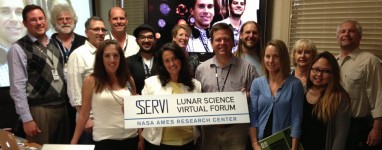At least that's the idea coming out of the 2013 Lunar Science Forum from the NASA Lunar Science Institute (NLSI). The 6th annual forum saw a number of changes, starting with a (budget-enforced) switch to being a completely virtual forum all the way to the announcement that the Lunar Science Institute is now the Solar System Exploration Research Virtual Institute (SSERVI). One can extrapolate from the organizational name change that the focus will not only be the Moon (think small-bodies like asteroids) but will also be virtual from here on out. My thoughts are that this is a good thing as the NLSI really seems to be trying to bridge the work between scientists, universities, and governmental organizations. There were a few questions throughout the forum asking about co-operation with the private sector although that discussion was, perhaps surprisingly, limited.
 |
| The SSERVI crew posing after a well-run virtual forum. |
One can easily garner the gist of current research and focus by looking over the agenda titles with lunar geology dominating most of the sessions (naturally), although there was a fair sprinkling of volatiles, exospheres, human exploration, heliophysics and other misc. items scattered throughout. The individual speakers ranged from extremely fascinating to hard-to-understand-for-various-reasons to dry-n-pedantic and the variation was largely independent of the subject matter.
The basic format was to have one or two general speakers do an introduction of sorts to the subject matter for the day. These were largely interesting and well done, giving brief overviews of the relevant issues and subject matter. For instance, the second day opened up with some quick introductions to geology and volatiles as they are present on the moon. Dana Hurley, of the John Hopkins Applied Physics Lab, began with an insight about how when she started in the field 15 years ago the questions would have been about whether or not water existed on the Moon, a question we now have thoroughly answered. The questions now, she asks, are: 1) What are the present day abundances of volatiles and 2) what is the actual composition of these volatiles? You can see her concise overview talk here but it seemed to reflect the general consensus that we have learned a whole lot recently and are about to learn a whole lot more.
Throughout the forum (I keep wanting to say conference) there was a lot of talk about LADEE, which is natural as it is about to launch (window opens Sept. 6 - see launch details) and will give a lot of science to most of the people attending the forum. It's interesting to see all the different components with LADEE and I can't seem to shake the feeling that everyone is trying to simultaneously pat each other on the back as well as up-sale the LADEE mission in an effort to convince people it is worthwhile. Actually, this is more the feeling I get out of everything that comes from NASA these days, which makes sense as they face large budget cuts and a public that is skeptical of spending money on things they don't understand. Including the need for lunar forums.
On a personal end, and as mentioned, I did participate in the Lightning Talks, with Krystal giving a good overview of the hard work she has been doing that I have been helping volunteer with. I also gave a quick summary of some of my plans to create an easy to use data acquisition black-box kind of thing for the lunar impact monitoring (details later). Overall, it was nice to get the (brief) exposure and a good chance to tout both PISCES and UH-Hilo.
SSERVI's concluding note highlights a few areas of interest, including the awards ceremonies, and links to the relevant areas. Below are a few talks that I thought were cool, in no particular order:
- Dan Lester, Putting Telepresence on the Moon [video]
- Elliot Sefton-Nash, Thermal Extremes in Permanently Shadowed Regions at the Lunar South Pole [video]
- William Bottke, On The Formation Age of South-Pole Aitken Basin [video]
- Danielle Moser (on behalf of Robert Suggs), Large Meteoroid Impact on Moon on 17 March 2013 [video - this gives a good overview of lunar impact monitoring, which is what I have specifically been doing)]
- Citizen Science and Professional Development - Brian Day and Noah Petro [video]
No comments:
Post a Comment